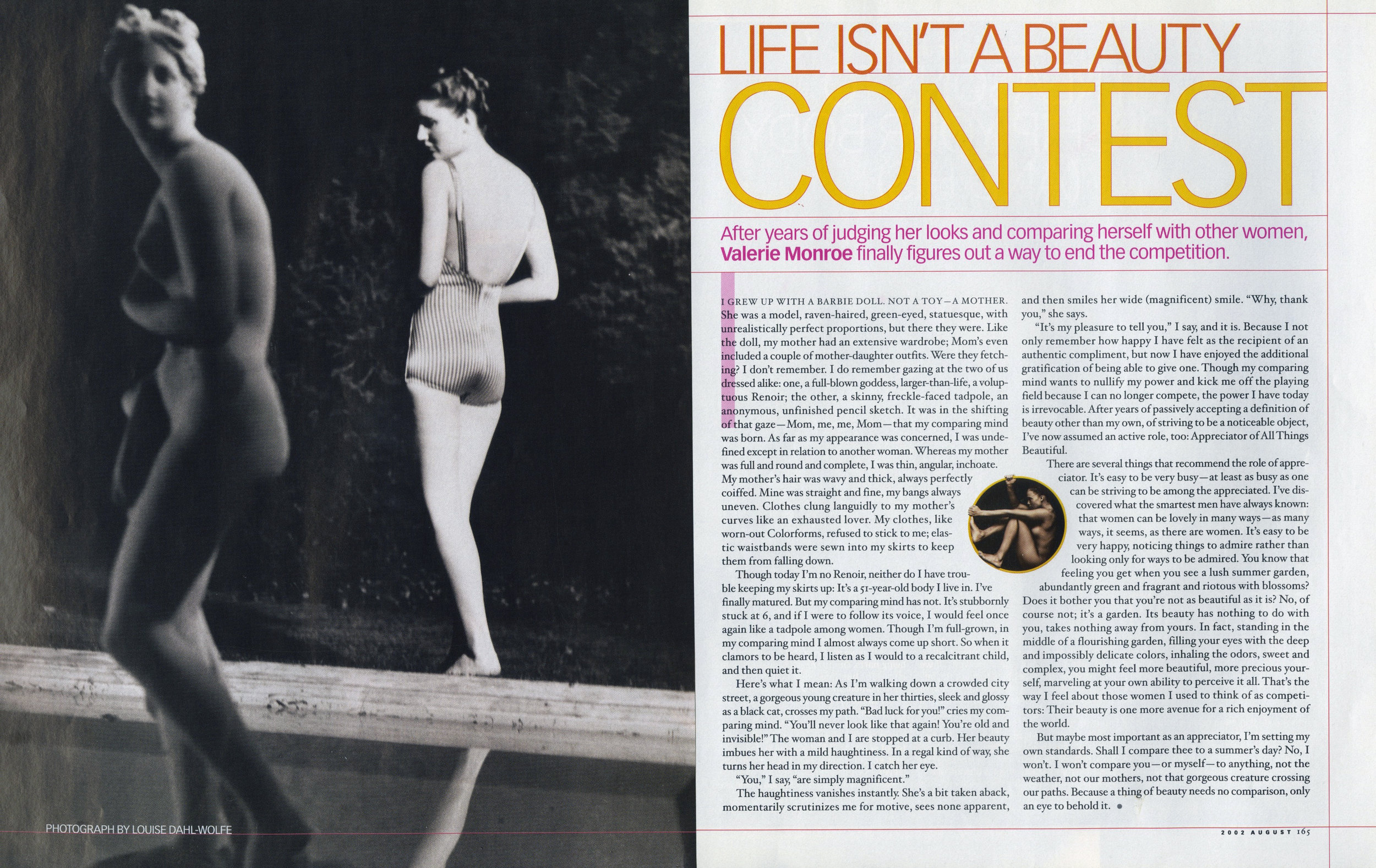Life Isn't A Beauty Contest
After years of judging her looks, Valerie Monroe finally figures out a way to end the competition.
I grew up with a Barbie doll. Not a toy—a mother. She was a model, raven-haired, green-eyed, statuesque, with unrealistically perfect proportions, but there they were. Like the doll, my mother had an extensive wardrobe; Mom's even included a couple of mother-daughter outfits. Were they fetching? I don't remember. I do remember gazing at the two of us dressed alike: one, a full-blown goddess, larger-than-life, a voluptuous Renoir; the other, a skinny, freckle-faced tadpole, an anonymous, unfinished pencil sketch. It was in the shifting of that gaze—Mom, me, me, Mom—that my comparing mind was born. As far as my appearance was concerned, I was undefined except in relation to another woman. Whereas my mother was full and round and complete, I was thin, angular, inchoate. My mother's hair was wavy and thick, always perfectly coiffed. Mine was straight and fine, my bangs always uneven. Clothes clung languidly to my mother's curves like an exhausted lover. My clothes, like worn-out Colorforms, refused to stick to me; elastic waistbands were sewn into my skirts to keep them from falling down.
Though today I'm no Renoir, neither do I have trouble keeping my skirts up: It's a 51-year-old body I live in. I've finally matured. But my comparing mind has not. It's stubbornly stuck at 6, and if I were to follow its voice, I would feel once again like a tadpole among women. Though I'm full-grown, in my comparing mind I almost always come up short. So when it clamors to be heard, I listen as I would to a recalcitrant child, and then quiet it.
Here's what I mean: As I'm walking down a crowded city street, a gorgeous young creature in her thirties, sleek and glossy as a black cat, crosses my path. "Bad luck for you!" cries my comparing mind. "You'll never look like that again! You're old and invisible!" The woman and I are stopped at a curb. Her beauty imbues her with a mild haughtiness. In a regal kind of way, she turns her head in my direction. I catch her eye.
"You," I say, "are simply magnificent."
The haughtiness vanishes instantly. She's a bit taken aback, momentarily scrutinizes me for motive, sees none apparent, and then smiles her wide (magnificent) smile. "Why, thank you," she says.
"It's my pleasure to tell you," I say, and it is. Because I not only remember how happy I have felt as the recipient of an authentic compliment, but now I have enjoyed the additional gratification of being able to give one. Though my comparing mind wants to nullify my power and kick me off the playing field because I can no longer compete, the power I have today is irrevocable. After years of passively accepting a definition of beauty other than my own, of striving to be a noticeable object, I've now assumed an active role, too: Appreciator of All Things Beautiful.
There are several things that recommend the role of appreciator. It's easy to be very busy—at least as busy as one can be striving to be among the appreciated. I've discovered what the smartest men have always known: that women can be lovely in many ways—as many ways, it seems, as there are women. It's easy to be very happy, noticing things to admire rather than looking only for ways to be admired. You know that feeling you get when you see a lush summer garden, abundantly green and fragrant and riotous with blossoms? Does it bother you that you're not as beautiful as it is? No, of course not; it's a garden. Its beauty has nothing to do with you, takes nothing away from yours. In fact, standing in the middle of a flourishing garden, filling your eyes with the deep and impossibly delicate colors, inhaling the odors, sweet and complex, you might feel more beautiful, more precious yourself, marveling at your own ability to perceive it all. That's the way I feel about those women I used to think of as competitors: Their beauty is one more avenue for a rich enjoyment of the world.
But maybe most important as an appreciator, I'm setting my own standards. Shall I compare thee to a summer's day? No, I won't. I won't compare you—or myself—to anything, not the weather, not our mothers, not that gorgeous creature crossing our paths. Because a thing of beauty needs no comparison, only an eye to behold it.

